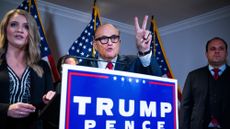Why even mentioning a female candidate's appearance can hurt her campaign
Note to men: Calling a woman like Kamala Harris pretty isn't going to help her political career

When President Obama called California Attorney General Kamala Harris "the best-looking attorney general in the country," the reactions ranged from liberal outrage to shrugged shoulders. Little did anyone know that Obama may have hurt her future political career.
That's because when the media focuses on a female candidate's appearance — whether it's positive, negative, or neutral — it drags down her poll numbers, according to a new study conducted by the Women's Media Center and women's advocacy group She Should Run.
The researchers asked 1,500 likely voters about a fictional male and female candidate. Some voters got information about each candidate without a physical description. Others got one of the following descriptions, taken from real campaign coverage during the 2012 elections:
Subscribe to The Week
Escape your echo chamber. Get the facts behind the news, plus analysis from multiple perspectives.

Sign up for The Week's Free Newsletters
From our morning news briefing to a weekly Good News Newsletter, get the best of The Week delivered directly to your inbox.
From our morning news briefing to a weekly Good News Newsletter, get the best of The Week delivered directly to your inbox.
Neutral description: Smith dressed in a brown blouse, black skirt, and modest pumps with a short heel…
Positive description: In person, Smith is fit and attractive and looks even younger than her age. At the press conference, smartly turned out in a ruffled jacket, pencil skirt, and fashionable high heels….
Negative description: Smith unfortunately sported a heavy layer of foundation and powder that had settled into her forehead lines, creating an unflattering look for an otherwise pretty woman, along with her famous fake, tacky nails. [Name It. Change It.]
It turns out that the female candidates with neutral, positive, and negative physical descriptions garnered 46, 43, and 42 percent of the vote, respectively. When there was no physical description, the female candidate scored 50 percent of the vote, leading the study's authors to conclude that paying any attention to a female candidate's appearance "hurt her likability" and made "voters less likely to vote for her."
The results have serious implications for American elections, writes Amanda Hess in Slate:
When Obama pointed attention to Kamala Harris’ looks, Politico media reporter Dylan Byers asked, "How did it become so difficult to call a woman good looking in public?" Name It. Change It.’s report suggests that it’s relatively easy for media commentators like Byers to call a woman hot — they just make it very hard for that woman to win. [Slate]
The study also suggests "that male candidates may have a big incentive to get their female opponent's looks talked about by the media," says Elizabeth Flock in U.S. News & World Report. Flock points out that "last week, a South Carolina GOP official noted that Elizabeth Colbert Busch, the Democrat facing former South Carolina Gov. Republican Mark Sanford in a special election for a South Carolina congressional seat, was 'not a bad-looking lady,' resulting in some 100 news stories on the comment."
How should female candidates respond to appearance-centric coverage? The study also found that voters react positively to candidates defending themselves against superficial coverage. In that respect, female politicians can follow Hillary Clinton's lead. She once won political points by saying, "If we ever want to get Bosnia off the front page, all I have to do is change my hair."
Sign up for Today's Best Articles in your inbox
A free daily email with the biggest news stories of the day – and the best features from TheWeek.com
Create an account with the same email registered to your subscription to unlock access.
Keith Wagstaff is a staff writer at TheWeek.com covering politics and current events. He has previously written for such publications as TIME, Details, VICE, and the Village Voice.
-
 Arizona grand jury indicts 18 in Trump fake elector plot
Arizona grand jury indicts 18 in Trump fake elector plotSpeed Read The state charged Mark Meadows, Rudy Giuliani and other Trump allies in 2020 election interference case
By Peter Weber, The Week US Published
-
 Antony Gormley's Time Horizon – a 'judgmental army' of 100 cast-iron men
Antony Gormley's Time Horizon – a 'judgmental army' of 100 cast-iron menThe Week Recommends Sculptures are 'everymen questioning the privilege of their surroundings' at the Norfolk stately home
By Adrienne Wyper, The Week UK Published
-
 'King's horses take free rein through London'
'King's horses take free rein through London'Today's Newspapers A roundup of the headlines from the US front pages
By The Week Staff Published
-
 Arizona court reinstates 1864 abortion ban
Arizona court reinstates 1864 abortion banSpeed Read The law makes all abortions illegal in the state except to save the mother's life
By Rafi Schwartz, The Week US Published
-
 Trump, billions richer, is selling Bibles
Trump, billions richer, is selling BiblesSpeed Read The former president is hawking a $60 "God Bless the USA Bible"
By Peter Weber, The Week US Published
-
 The debate about Biden's age and mental fitness
The debate about Biden's age and mental fitnessIn Depth Some critics argue Biden is too old to run again. Does the argument have merit?
By Grayson Quay Published
-
 How would a second Trump presidency affect Britain?
How would a second Trump presidency affect Britain?Today's Big Question Re-election of Republican frontrunner could threaten UK security, warns former head of secret service
By Harriet Marsden, The Week UK Published
-
 'Rwanda plan is less a deterrent and more a bluff'
'Rwanda plan is less a deterrent and more a bluff'Instant Opinion Opinion, comment and editorials of the day
By The Week UK Published
-
 Henry Kissinger dies aged 100: a complicated legacy?
Henry Kissinger dies aged 100: a complicated legacy?Talking Point Top US diplomat and Nobel Peace Prize winner remembered as both foreign policy genius and war criminal
By Harriet Marsden, The Week UK Last updated
-
 Trump’s rhetoric: a shift to 'straight-up Nazi talk'
Trump’s rhetoric: a shift to 'straight-up Nazi talk'Why everyone's talking about Would-be president's sinister language is backed by an incendiary policy agenda, say commentators
By The Week UK Published
-
 More covfefe: is the world ready for a second Donald Trump presidency?
More covfefe: is the world ready for a second Donald Trump presidency?Today's Big Question Republican's re-election would be a 'nightmare' scenario for Europe, Ukraine and the West
By Sorcha Bradley, The Week UK Published